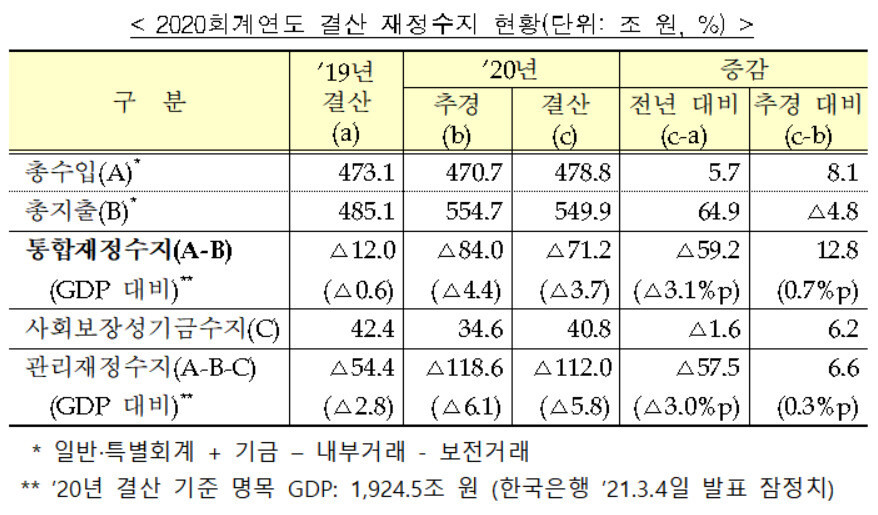※ Click the image to see it larger.
Last year, government housekeeping recorded the largest deficit in history due to expanded fiscal policies, such as organizing four additional supplementary accounts to respond to Corona 19. Nevertheless, the ratio of deficit to gross domestic product was relatively low and low compared to that of major countries. The government held a state council meeting on the 6th to deliberate and make a decision on the’National Accounting Report for Fiscal 2020′. Last year’s total income was 47.8 trillion won, and total expenditure was 54.9 trillion won. The consolidated fiscal balance (total income-total expenditure) recorded a deficit of 71.2 trillion won, the largest ever at 3.7% of last year’s gross domestic product (GDP, 1924 trillion won). The administrative fiscal balance, minus the balance of social security funds such as the national pension, was 112 trillion won in deficit, which was 5.8% of gross domestic product. The national debt amounted to 846 trillion won, of which the central government debt was 819 trillion won, an increase of 12 trillion won compared to the previous year (699 trillion won). The local government’s debt was 2.7 trillion won, an increase of 3.4 trillion won compared to the previous year. The ratio of national debt to gross domestic product (GDP) was 44%, an increase of 6.3 percentage points from the previous year. It has surpassed 40% in 11 years since it exceeded 30% in 2009. Lee Ji-won, head of the Ministry of Finance, said, “The size of the deficit has been the largest since 2011, when management fiscal balance statistics were officially managed through open finances. “The result of a significant increase in spending for overcoming and economic vitality.” State debt, including provisions for government officials and military pensions, which must be filled in for future expenditures, was 1985 trillion and 300 billion won, an increase of 244.1 trillion won from the previous year. The pension provision for civil servants was 82.8 trillion won last year, and the pension provision for military personnel was 21.9 trillion won. In addition, national assets such as national pension operating income increased by 19 trillion KRW to 2490 trillion KRW. The government is in a position that it is desirable to overcome the crisis early and secure economic dynamism through expanded financing despite a temporary increase in debt. According to the forecast of the International Monetary Fund (IMF) fiscal balance, last year’s fiscal balance (general government standard) deficit ratio of Korea’s gross domestic product was -3.1%, lower than the average of developed countries -13.3% and the world average -11.8%. By Lee Jung-hoon, staff reporter [email protected]
newsletter
Every morning, every Thursday day
A friendly newsletter that will save you from the flood of news.
Meet
